【中考考点清单】2014年中考英语(湖南专用 新课标)总复习课件:第一部分 教材知识梳理 八年级(下)Unit 5(含中考试题示例)
文档属性
| 名称 | 【中考考点清单】2014年中考英语(湖南专用 新课标)总复习课件:第一部分 教材知识梳理 八年级(下)Unit 5(含中考试题示例) | 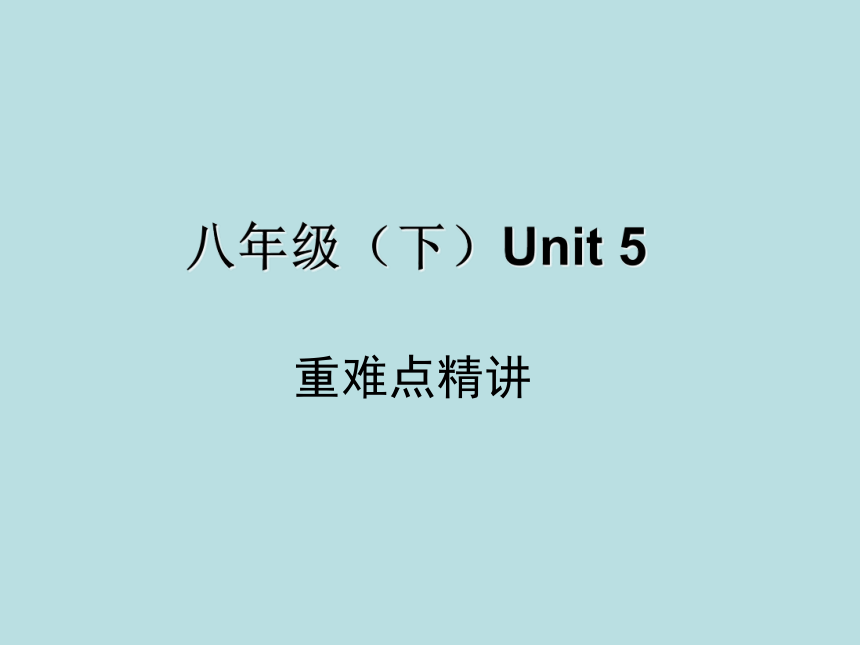 | |
| 格式 | zip | ||
| 文件大小 | 1.1MB | ||
| 资源类型 | 教案 | ||
| 版本资源 | 通用版 | ||
| 科目 | 英语 | ||
| 更新时间 | 2014-01-21 20:20:56 | ||
图片预览



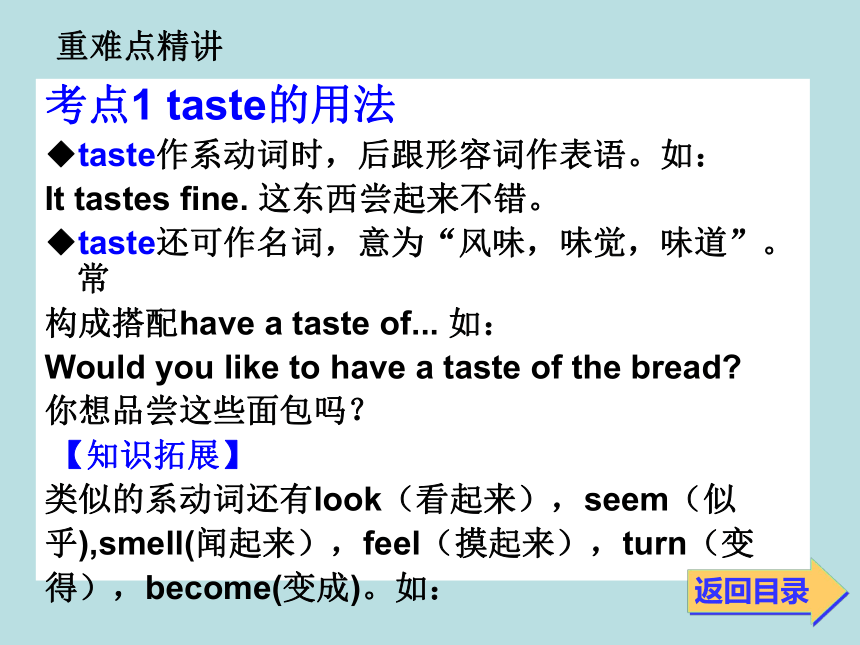
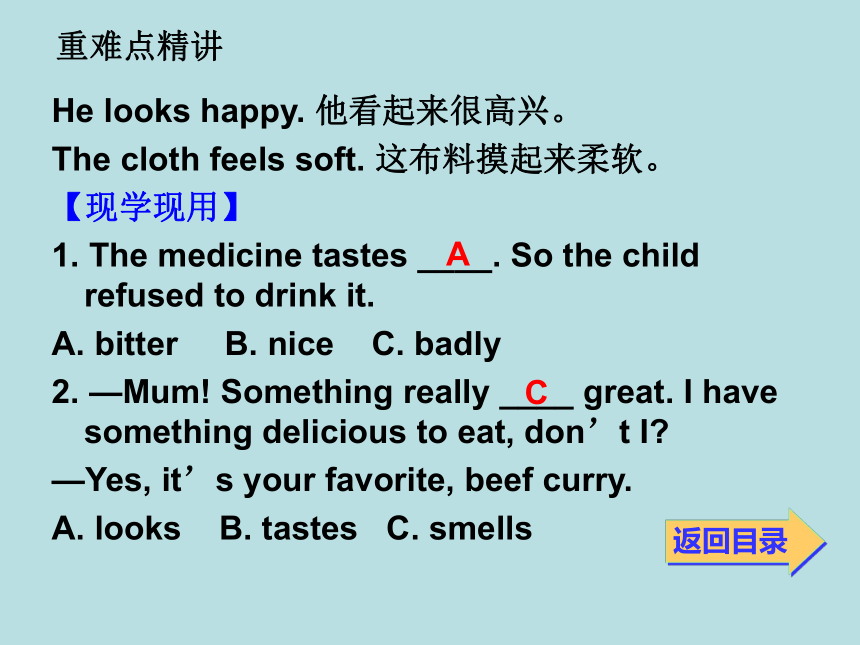
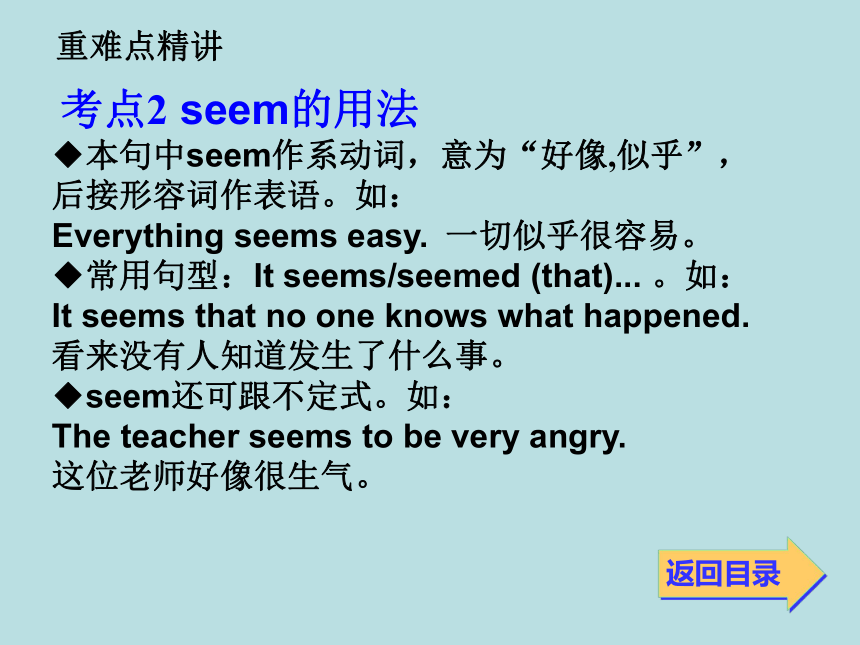
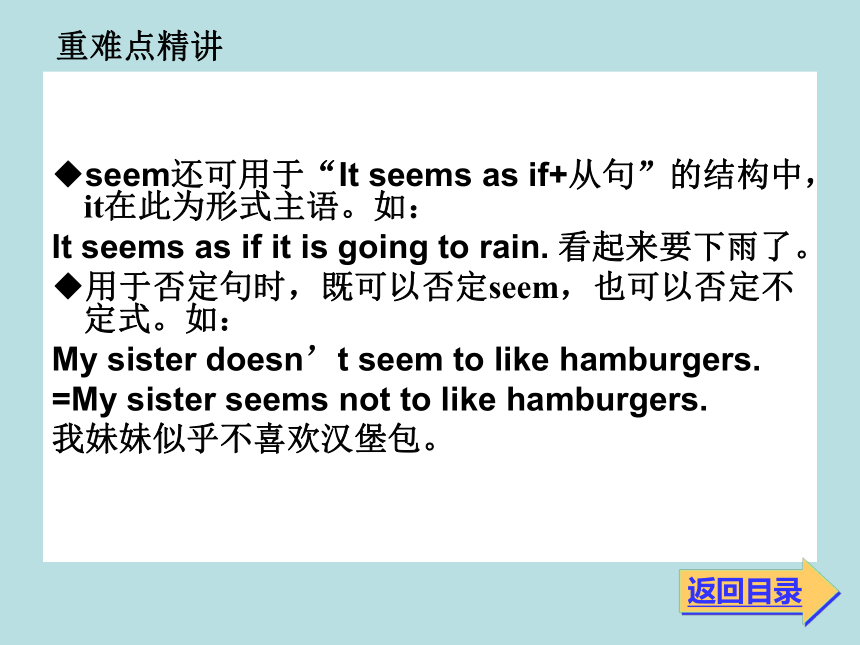
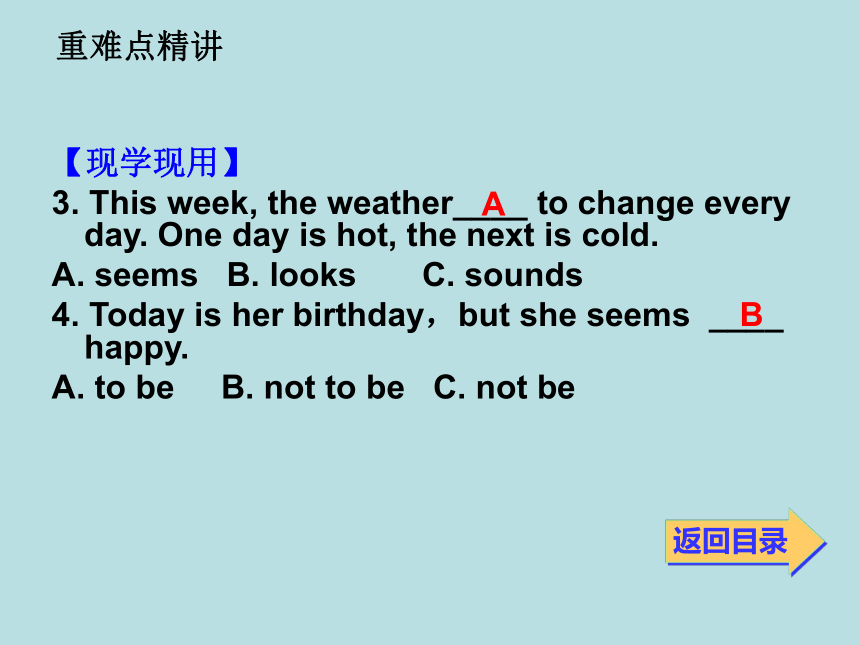

文档简介
课件24张PPT。
重难点精讲 八年级(下)Unit 5
考点1 taste的用法
考点2 seem的用法
考点3 辨析proud与pride
考点4 strict的用法
考点5 as...as的用法
考点6 辨析deal with与都with
考点7 辨析not...any longer, no
longer, not...any more与no more
考点8 辨析 asleep,sleep,sleepy与
sleeping 考点1 taste的用法
◆taste作系动词时,后跟形容词作表语。如:
It tastes fine. 这东西尝起来不错。
◆taste还可作名词,意为“风味,味觉,味道”。常
构成搭配have a taste of... 如:
Would you like to have a taste of the bread?
你想品尝这些面包吗?
【知识拓展】
类似的系动词还有look(看起来),seem(似
乎),smell(闻起来),feel(摸起来),turn(变
得),become(变成)。如:重难点精讲返回目录He looks happy. 他看起来很高兴。
The cloth feels soft. 这布料摸起来柔软。
【现学现用】
1. The medicine tastes ____. So the child refused to drink it.
A. bitter B. nice C. badly
2. —Mum! Something really ____ great. I have something delicious to eat, don’t I?
—Yes, it’s your favorite, beef curry.
A. looks B. tastes C. smells 返回目录重难点精讲AC
重难点精讲返回目录 考点2 seem的用法
◆本句中seem作系动词,意为“好像,似乎”,后接形容词作表语。如:
Everything seems easy. 一切似乎很容易。
◆常用句型:It seems/seemed (that)... 。如:
It seems that no one knows what happened.
看来没有人知道发生了什么事。
◆seem还可跟不定式。如:
The teacher seems to be very angry.
这位老师好像很生气。
◆seem还可用于“It seems as if+从句”的结构中,it在此为形式主语。如:
It seems as if it is going to rain. 看起来要下雨了。
◆用于否定句时,既可以否定seem,也可以否定不定式。如:
My sister doesn’t seem to like hamburgers.
=My sister seems not to like hamburgers.
我妹妹似乎不喜欢汉堡包。
重难点精讲返回目录
【现学现用】
3. This week, the weather____ to change every day. One day is hot, the next is cold.
A. seems B. looks C. sounds
4. Today is her birthday,but she seems ____ happy.
A. to be B. not to be C. not be
返回目录重难点精讲AB 考点3 辨析proud与pride
◆proud是形容词,意为“骄傲的,自豪的”。常用在be proud of短语中,意为 “为……感到自豪”。如:
As Chinese, we are all proud of our great
country. 作为中国人,我们为伟大的祖国感到骄傲。
◆pride是名词,意为 “骄傲,自豪”。 常用于take pride in短语中,意为“对……感到自豪”。如:
My father always takes pride in everything
good I do.
我父亲总是为我做的一切好事而感到骄傲。
返回目录重难点精讲
【现学现用】
5. I feel very ____ when I see the national flag of China.
A. proud B. pride C. be proud of
6. What are you most ____ in your life?
A. proud in B. pride in C. proud of
返回目录重难点精讲AC 考点4 strict的用法
◆strict常用于短语:be strict with sb. 对某人要求严厉。如:
Our teachers are very strict with us.我们老师
对我们要求非常严厉。
◆be strict in sth. “对某事要求严格。如:
My father is very strict in his work.
我爸爸对他的工作要求严格。返回目录重难点精讲 返回目录重难点精讲
【现学现用】
7. The teacher ____ is talking with Jane is strict ____us.
A. who; in B. that; about C. who; with
8. My parents ____ my study.
A. are strict B. are strict with C. are strict inCC
考点5 as... as... 的用法
①as+adj. /adv. (原级)+as... 和……一样……
②not as... as... =not so... as... =less... than... 不如…… 如:
This sweater is not as/so expensive as that one.=This sweater is less expensive than that one. 这件毛衣不如那件贵。
返回目录重难点精讲
返回目录重难点精讲
【知识拓展】
the same as与as... as的区别
两者均为“和……一样”,the same+名词+as+名词/从句;而as+形容词/副词+as+名词。如:
the same age as you 和你同岁
The letter was written in the same year that the novel was published. 那封信写在那部小说发表的那一年。
as beautiful as... 和……一样美丽
返回目录
【现学现用】
9. Some Chinese singers sing English songs
just as ____ as native speakers do.
A. good B. better C. well
10. We don’t have much homework now and
our school bags are ____ they used to be.
A. as heavy as B. not as heavy as
C. not as heavily as
返回目录重难点精讲CB考点6 辨析deal with 与do with
◆deal with常与how连用,而do with常与what连用。如:
I don’t know how they deal with the problem.
(=I don’t know what they do with the problem. )
我不知道他们是如何处理这个问题的。
◆这两个词组在使用时有细微的差别。一般来说,
do with表示“处置;忍受;相处;有关”等。如:
They found a way to do with the elephant. 他们
找到对付那头大象的办法了。
返回目录重难点精讲
◆deal with意义很广,常表示“对付;应付;处理;安排;论述;涉及”等。如:
Deal with a man as he deals with you.
以其人之道,还治其人之身。
返回目录重难点精讲
【现学现用】
11. I don’t know what to ____ the computer.
A. deal with B. do with C. talk with
12. —These problems are too difficult for me to ____.Could you give me a hand?
—Sure. There are many ways. The most
important is to have a careful plan.
A. deal with B. compare with C. talk with返回目录重难点精讲BA
考点7 辨析not ... any longer,no
longer,not ... any more与no more
◆no longer=not... any longer 指持续了一段时间的动作状态已“不再延续”,着重指时间方面,常与延续性动词连用。
◆no more=not... any more 指某一反复发生的动作已“不再重复”,着重指重复次数方面,还可指程度上和数量上不再重复,常与非延续性动词连用。
注意:1. no longer与no more 不分开使用。 重难点精讲返回目录
2. not... any longer和not... any more结构中,not常与动词、助动词或情态动词连用,而“不再怎么样”中的“怎么样”用在not与any longer或 any more中间。如:
①They are no longer living here. =They aren’t
living here any longer. 他们不再住这儿了。
②I see him no more. =I don’t see him any more.
我再也见不到他了。
返回目录重难点精讲
【现学现用】
13. She could ____ find a way to get into the
valley.
A. no longer B. no more C. any longer
14. He can’t stand the enviromen ____.
A. any more B. any longer C. no more
返回目录重难点精讲AA考点8 辨析asleep,sleep,sleepy与sleeping
◆asleep为表语形容词,意为“睡着的,不活泼的”,如:
He is asleep. 他睡着了。
◆sleep作名词,意为“睡觉”,为抽象概念;作动词,亦意为“睡觉”,指睡觉这一行为,如:
I often have a short sleep at noon. 我经常在中午
小睡一会儿。
返回目录重难点精讲 返回目录重难点精讲
◆sleepy为形容词,表示“欲睡的,困乏的,没有精神的”,表状态,如:
a sleepy worker 困乏的工人
◆sleeping可作非谓语动词和定语形容词。作非谓语动词时有两种用法:①现在分词,用于进行时态,如:He is sleeping. 也可用作状语,如:sleeping for long②作定语形容词时,其可置于名词之前作前置定语修饰名词,如:a sleeping beauty睡美人。
【现学现用】
15. When he saw his mother coming, he
pretended to be a ____ expression.
A. asleep B. sleep C. sleepy
16. I hope to improve my____ with the
medicine.
A. sleep B. sleeping C. sleepy
返回目录CA
重难点精讲 八年级(下)Unit 5
考点1 taste的用法
考点2 seem的用法
考点3 辨析proud与pride
考点4 strict的用法
考点5 as...as的用法
考点6 辨析deal with与都with
考点7 辨析not...any longer, no
longer, not...any more与no more
考点8 辨析 asleep,sleep,sleepy与
sleeping 考点1 taste的用法
◆taste作系动词时,后跟形容词作表语。如:
It tastes fine. 这东西尝起来不错。
◆taste还可作名词,意为“风味,味觉,味道”。常
构成搭配have a taste of... 如:
Would you like to have a taste of the bread?
你想品尝这些面包吗?
【知识拓展】
类似的系动词还有look(看起来),seem(似
乎),smell(闻起来),feel(摸起来),turn(变
得),become(变成)。如:重难点精讲返回目录He looks happy. 他看起来很高兴。
The cloth feels soft. 这布料摸起来柔软。
【现学现用】
1. The medicine tastes ____. So the child refused to drink it.
A. bitter B. nice C. badly
2. —Mum! Something really ____ great. I have something delicious to eat, don’t I?
—Yes, it’s your favorite, beef curry.
A. looks B. tastes C. smells 返回目录重难点精讲AC
重难点精讲返回目录 考点2 seem的用法
◆本句中seem作系动词,意为“好像,似乎”,后接形容词作表语。如:
Everything seems easy. 一切似乎很容易。
◆常用句型:It seems/seemed (that)... 。如:
It seems that no one knows what happened.
看来没有人知道发生了什么事。
◆seem还可跟不定式。如:
The teacher seems to be very angry.
这位老师好像很生气。
◆seem还可用于“It seems as if+从句”的结构中,it在此为形式主语。如:
It seems as if it is going to rain. 看起来要下雨了。
◆用于否定句时,既可以否定seem,也可以否定不定式。如:
My sister doesn’t seem to like hamburgers.
=My sister seems not to like hamburgers.
我妹妹似乎不喜欢汉堡包。
重难点精讲返回目录
【现学现用】
3. This week, the weather____ to change every day. One day is hot, the next is cold.
A. seems B. looks C. sounds
4. Today is her birthday,but she seems ____ happy.
A. to be B. not to be C. not be
返回目录重难点精讲AB 考点3 辨析proud与pride
◆proud是形容词,意为“骄傲的,自豪的”。常用在be proud of短语中,意为 “为……感到自豪”。如:
As Chinese, we are all proud of our great
country. 作为中国人,我们为伟大的祖国感到骄傲。
◆pride是名词,意为 “骄傲,自豪”。 常用于take pride in短语中,意为“对……感到自豪”。如:
My father always takes pride in everything
good I do.
我父亲总是为我做的一切好事而感到骄傲。
返回目录重难点精讲
【现学现用】
5. I feel very ____ when I see the national flag of China.
A. proud B. pride C. be proud of
6. What are you most ____ in your life?
A. proud in B. pride in C. proud of
返回目录重难点精讲AC 考点4 strict的用法
◆strict常用于短语:be strict with sb. 对某人要求严厉。如:
Our teachers are very strict with us.我们老师
对我们要求非常严厉。
◆be strict in sth. “对某事要求严格。如:
My father is very strict in his work.
我爸爸对他的工作要求严格。返回目录重难点精讲 返回目录重难点精讲
【现学现用】
7. The teacher ____ is talking with Jane is strict ____us.
A. who; in B. that; about C. who; with
8. My parents ____ my study.
A. are strict B. are strict with C. are strict inCC
考点5 as... as... 的用法
①as+adj. /adv. (原级)+as... 和……一样……
②not as... as... =not so... as... =less... than... 不如…… 如:
This sweater is not as/so expensive as that one.=This sweater is less expensive than that one. 这件毛衣不如那件贵。
返回目录重难点精讲
返回目录重难点精讲
【知识拓展】
the same as与as... as的区别
两者均为“和……一样”,the same+名词+as+名词/从句;而as+形容词/副词+as+名词。如:
the same age as you 和你同岁
The letter was written in the same year that the novel was published. 那封信写在那部小说发表的那一年。
as beautiful as... 和……一样美丽
返回目录
【现学现用】
9. Some Chinese singers sing English songs
just as ____ as native speakers do.
A. good B. better C. well
10. We don’t have much homework now and
our school bags are ____ they used to be.
A. as heavy as B. not as heavy as
C. not as heavily as
返回目录重难点精讲CB考点6 辨析deal with 与do with
◆deal with常与how连用,而do with常与what连用。如:
I don’t know how they deal with the problem.
(=I don’t know what they do with the problem. )
我不知道他们是如何处理这个问题的。
◆这两个词组在使用时有细微的差别。一般来说,
do with表示“处置;忍受;相处;有关”等。如:
They found a way to do with the elephant. 他们
找到对付那头大象的办法了。
返回目录重难点精讲
◆deal with意义很广,常表示“对付;应付;处理;安排;论述;涉及”等。如:
Deal with a man as he deals with you.
以其人之道,还治其人之身。
返回目录重难点精讲
【现学现用】
11. I don’t know what to ____ the computer.
A. deal with B. do with C. talk with
12. —These problems are too difficult for me to ____.Could you give me a hand?
—Sure. There are many ways. The most
important is to have a careful plan.
A. deal with B. compare with C. talk with返回目录重难点精讲BA
考点7 辨析not ... any longer,no
longer,not ... any more与no more
◆no longer=not... any longer 指持续了一段时间的动作状态已“不再延续”,着重指时间方面,常与延续性动词连用。
◆no more=not... any more 指某一反复发生的动作已“不再重复”,着重指重复次数方面,还可指程度上和数量上不再重复,常与非延续性动词连用。
注意:1. no longer与no more 不分开使用。 重难点精讲返回目录
2. not... any longer和not... any more结构中,not常与动词、助动词或情态动词连用,而“不再怎么样”中的“怎么样”用在not与any longer或 any more中间。如:
①They are no longer living here. =They aren’t
living here any longer. 他们不再住这儿了。
②I see him no more. =I don’t see him any more.
我再也见不到他了。
返回目录重难点精讲
【现学现用】
13. She could ____ find a way to get into the
valley.
A. no longer B. no more C. any longer
14. He can’t stand the enviromen ____.
A. any more B. any longer C. no more
返回目录重难点精讲AA考点8 辨析asleep,sleep,sleepy与sleeping
◆asleep为表语形容词,意为“睡着的,不活泼的”,如:
He is asleep. 他睡着了。
◆sleep作名词,意为“睡觉”,为抽象概念;作动词,亦意为“睡觉”,指睡觉这一行为,如:
I often have a short sleep at noon. 我经常在中午
小睡一会儿。
返回目录重难点精讲 返回目录重难点精讲
◆sleepy为形容词,表示“欲睡的,困乏的,没有精神的”,表状态,如:
a sleepy worker 困乏的工人
◆sleeping可作非谓语动词和定语形容词。作非谓语动词时有两种用法:①现在分词,用于进行时态,如:He is sleeping. 也可用作状语,如:sleeping for long②作定语形容词时,其可置于名词之前作前置定语修饰名词,如:a sleeping beauty睡美人。
【现学现用】
15. When he saw his mother coming, he
pretended to be a ____ expression.
A. asleep B. sleep C. sleepy
16. I hope to improve my____ with the
medicine.
A. sleep B. sleeping C. sleepy
返回目录CA
